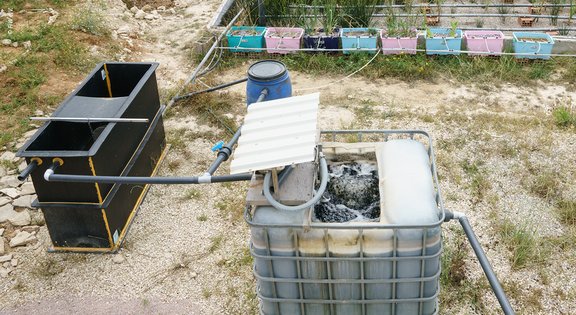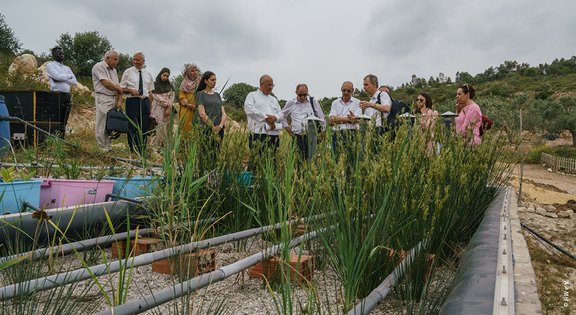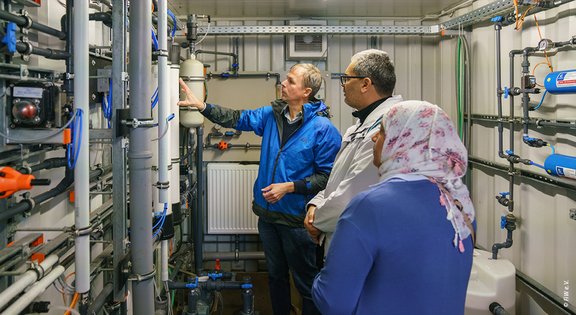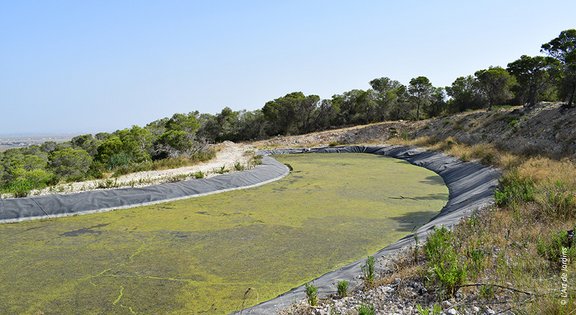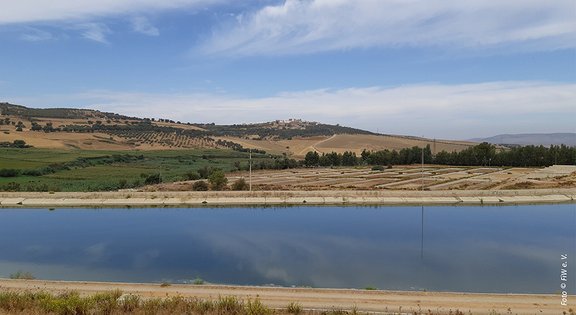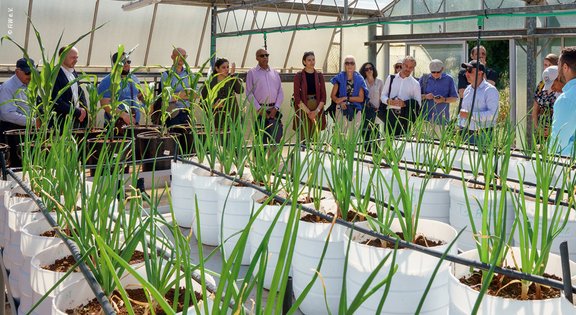Water Reuse – New Methods to increase Water and Food Security
The use of treated wastewater reduces pressure on natural resources and can contribute to increased water security worldwide
Water reuse, also known as water recycling, is gaining global significance. It describes the use of treated urban or industrial wastewater with the goal of using limited water resources as efficiently as possible. Given the growing water scarcity and changing climatic conditions, the efficient use and reuse of unconventional water resources are becoming increasingly important to ensure adequate supply security for the population, industry, and agriculture.
Recirculation and reuse of treated water can make a significant contribution to reducing water demand, particularly in industry, where the range of industrial requirements for water quality and quantity is extensive and offers a variety of options. Water from production processes can be purified and reused, which can simultaneously contribute to reducing environmental impact. In this context, the reuse of water is not necessarily required within the same process chain. By analysing the water needs of neighbouring industries, such as within an industrial park, the coupling of different companies or even sectors can also be realised. This reduces the need for fresh water resources, lowers costs, and minimizes the ecological footprint. Water reuse in the industry thus contributes to sustainability and resource conservation.
In agriculture, the reuse of treated municipal wastewater can also be a suitable measure to adapt to climate change. For recycling purposes, purified wastewater can also be used within municipalities, for example, for the irrigation of green spaces. A trend of water reuse for direct and indirect potable use is currently evident, especially in countries affected by water scarcity, to increase the water supply security for the population while simultaneously reducing pressure on natural resources. Globally, there are a variety of regulations and guidelines defining the minimum quality requirements for treated water for safe reuse. The Regulation on Water Reuse (Regulation (EU) 2020/741), which came into force in all EU Member States on 26 June 2023, sets uniform minimum requirements for water quality, monitoring and risk assessment for the reuse of treated municipal wastewater for agricultural purposes within the EU, with the aim of increasing consumer and farmer confidence in the technology and promoting further dissemination and exploitation of its potential.
As part of several national and international projects, FiW develops technical solutions and innovative concepts for the implementation of water reuse and is committed to the active dissemination of reliable technologies that are tailored to the intended use and the required chemical and hygienic qualities. In addition to large-scale facilities, decentralized water treatment plants are also being implemented, which can be supplied with electrical energy via solar panels as needed.
For Tunisia and other countries in the Maghreb region, meeting the freshwater demand for agriculture and food processing it becoming increasingly difficult. The main reasons are the increasing demand due to population growth and rising prosperity but also climatic influences. For this reason, intensive efforts are being made to exploit the potential of wastewater reuse. Increased salt concentrations in wastewater, hygienic quality aspects, decentralized applicability and economic feasibility are major challenges in this context.
Funding / Supervisor: Federal Ministry of Education and Research Germany (BMBF) / DLR Projektträger
Project Partners: TERRA URBANA Umlandentwicklungsgesellschaft mbH (TUG); Centre des Recherches et des Technologies des Eaux (CERTE); Art des Jardins (ADJ)
Associated Partners: Office National de l’Assainissement (ONAS), Tunis; Groupement de Développement Agricole (GDA) Sidi Amor; Djebel Sidi Amor; Institut National Agronomique de Tunisie (INAT), Tunis
Continue to reference WaterReTunE
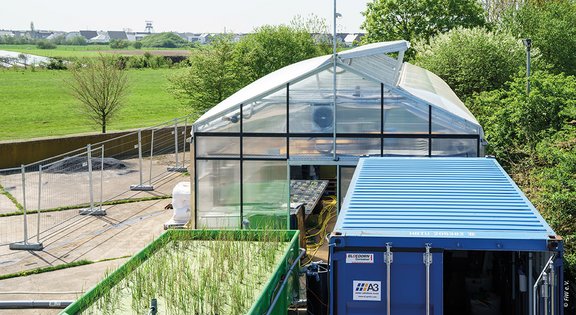
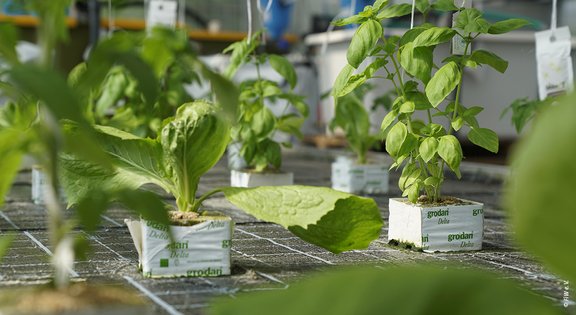
As a permanently available resource, treated wastewater is too valuable in times of climate change to be discharged unused into water bodies. Regulation (EU) 2020/741 now regulates minimum requirements for water reuse, which will also apply in Germany from 26 June 2023.
Under the leadership of FiW e. V., the BMBF pilot project awaregio demonstrated the development of innovative key components for the reuse of wastewater, wastewater-based nutrients and energy in agriculture, fish farming and for drinking water substitution, opening up new market opportunities for small and medium-sized enterprises (SMEs) in regions under structural change.
Funding / Supervisor: Federal Ministry of Education and Research (BMBF) / Projektträger Karlsruhe (PTKA)
Project Partners: Linksniederrheinische Entwässerungs-Genossenschaft (LINEG); TERRA URBANA Umlandentwicklungsgesellschaft mbH; A3 Water Solutions GmbH; EvU® – Innovative Umwelttechnik GmbH; Institut für Umweltforschung, RWTH Aachen University; Institut für Infrastruktur und Ressourcenmanagement der Universität Leipzig
Continue to reference awaregio
Morocco is a long-standing partner country of FiW and BICC. Many projects have been realized through the financing of international cooperation such as GIZ and KfW Entwicklungsbank. A bilateral research project has now been developed on the basis of experience and networks. To this end, the Federal Ministry of Education and Research (BMBF) has made a financial contribution and the German-Moroccan research project I-WALAMAR was launched in summer 2019 for a period of 3 years. In this project, partners from both countries conduct research on innovative techniques that protect not only water resources but also the environment and soil.
Moroccan agriculture is currently experiencing intensification and commercialisation. In the Fès-Meknès region, in addition to the economic and social impact, there are also significant impacts on soil and water resources in highly cultivated areas. The large amounts of wastewater from olive processing and the discharge of municipal wastewater are, among the overuse of natural water, the main problems in the I-WALAMAR area (Saïss plateau). Soil degradation due to intensive land cultivation under semi-arid conditions leads to increasing desertification. The climate crisis makes the situation even more difficult.
Funding / Supervisor: Federal Ministry of Education and Research (BMBF) / DLR Projektträger
Project Partners: Bonn International Center for Conversion (BICC); Universität Hohenheim; Institut für Agrartechnik; Fg. Agrartechnik in den Tropen und Subtropen; FH Aachen; Institut für Angewandte Polymerchemie (IAP); Palaterra Betriebs- und Beteiligungsgesellschaft mbH; InnoAgri GmbH; SEBA Hydrometrie GmbH & Co. KG; + 8 more Moroccan partners
Continue to reference I-WALAMAR





